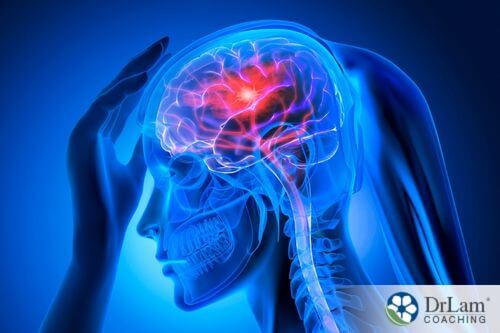 Do you suffer from migraines? Migraines can severely disrupt every aspect of your life and cause a lot of pain and distress. Unfortunately, there seems to be a connection between female hormones like progesterone and estrogen and migraines. This is why more women than men suffer from migraines, particularly during times of hormonal change. Understanding your own body and the changes that it experiences is key to improving your health. That’s why it's a good idea to look at the research about the link between menopause and migraines.
Do you suffer from migraines? Migraines can severely disrupt every aspect of your life and cause a lot of pain and distress. Unfortunately, there seems to be a connection between female hormones like progesterone and estrogen and migraines. This is why more women than men suffer from migraines, particularly during times of hormonal change. Understanding your own body and the changes that it experiences is key to improving your health. That’s why it's a good idea to look at the research about the link between menopause and migraines.
If you get migraines, then you probably already know what they are. They’re a kind of severe headache and when you get one, you’ll probably be unable to keep up your daily activities. Unfortunately, some women get migraines as often as 15 times a month, which can severely impact their quality of life.
Migraines aren’t the same as headaches. They’re more severe and are often accompanied by other symptoms like:
There isn’t one clear cause of migraines, and they’re often a bit of a medical mystery. However, some known triggers of migraines are:
This final trigger is responsible for the link between menopause and migraines.
The exact cause of migraines isn’t known. However, there is a link between female hormone changes and migraines. Research suggests that estrogen and progesterone, two of the most important hormones in the female body, may affect migraine-related chemicals in the brain.
Migraines are most common among people of child-bearing age. In women who are prone to migraines, the risk of suffering a migraine in the two days leading up to a period is increased by as much as 71 percent. This may be due to the drop in estrogen levels that occurs right before a period starts. However, research also shows that migraines are more common around the time of ovulation, when estrogen levels peak. This suggests that estrogen levels, high or low, may play an important role in migraines.
As you would expect from this research, many women find that their migraines stop once they go through menopause. However, the link between menopause and migraines isn’t as pleasant for other women.
The connection between menopause and migraines seems to vary from person to person. Some women find that their migraines worsen in the perimenopausal stage, which is before menopause actually occurs. This may be due to the fluctuating hormone levels that occur during this phase. Once menopause is over however, many women find relief from their migraines as hormone levels stabilize.
However, there is a small subset of women who find that their migraines get worse after menopause. There is also evidence that some women experience more migraines after menopause. It really just depends on how your body reacts to the changes in your hormone levels.
 If you experience regular migraines, no matter what age or stage of life you’re in, then you need to see your doctor. They will be able to work with you to find the potential causes of your migraines and help you find strategies to reduce or eliminate them.
If you experience regular migraines, no matter what age or stage of life you’re in, then you need to see your doctor. They will be able to work with you to find the potential causes of your migraines and help you find strategies to reduce or eliminate them.
A wide range of strategies can help with migraines, but no one strategy will work for everyone. Here are some of the most common and effective strategies for migraine relief:
If you’re suffering from migraines because of hormone changes, then you might immediately think about bioidentical hormone therapy. However, you will need to be careful and work closely with your doctor if you try this option. Research into the link between menopause and migraines suggests that bioidentical hormone replacement therapy may actually make menopausal migraines worse, causing higher rates of headaches.
However, other studies do show that hormone replacement therapy can be helpful in some migraine cases, so it’s worth talking to your doctor about your options. If you want to try hormone replacement therapy to help with migraines, then ask your doctor about:
And of course, if you continue to experience severe side effects, then stop the therapy and try something else. Understand that if you have menstrual migraines with aura, it's actually contraindicated to take birth control pills.
Oral pain medications, such as anti-inflammatories, can offer relief from migraine pain, but this is only a mask and not a prevention of migraines. If you experience frequent migraines, then you might need to talk to your doctor about the safest options.
There are certain medications that can help prevent or reduce migraine episodes if taken daily. These medications do have side effects, so talk to your doctor first. Some medications that effectively prevent migraines in some people are:
One of the best prevention supplements for migraines is magnesium. Every person has different dosing tolerance, so the general idea of getting to a good dose is to daily increase your magnesium supplements by one serving until you start to get looser stools, then back down by one serving. A few other supplements that are great are melatonin, butterbur, and CoQ10. However always ask your provider before starting these supplements.
Your doctor can prescribe some medications like triptans that stop or lessen the severity of migraines. These are only to be taken as needed, and shouldn't be taken daily.
This is a type of brain stimulation that can help ease migraine symptoms and reduce migraine frequency.
Stress, certain chemicals and preservatives, and some foods or drinks can trigger migraines, so making changes to avoid these triggers can offer migraine relief. Some lifestyle strategies and therapies that may help you manage your migraines are:
 Adrenal Fatigue Syndrome (AFS) is caused by stress, which can also bring on or worsen migraines. Stress is usually managed in the body by the NeuroEndoMetabolic (NEM) stress response, which uses cortisol to make changes throughout the body that help during stressful periods.
Adrenal Fatigue Syndrome (AFS) is caused by stress, which can also bring on or worsen migraines. Stress is usually managed in the body by the NeuroEndoMetabolic (NEM) stress response, which uses cortisol to make changes throughout the body that help during stressful periods.
But when stress is chronic, the resulting high demand for cortisol puts pressure on the adrenal glands, which can then begin to become unable to keep up with demand. The high cortisol levels and adrenal fatigue will also affect the circuits, sets of related organ systems, in the NEM stress response. Stress and high cortisol levels change how these circuits function. And if the stress isn’t resolved and cortisol levels remain high, these changes in function can become normal and start to cause malfunctions in the circuits and in their individual components.
People with AFS are more likely to experience migraines or find that their migraines get worse because of stress and general ill health. This will cause additional stress and inflammation in the body, increasing the body’s overall stress levels. This will increase the body’s demand for cortisol and worsen adrenal fatigue.
The link between menopause and migraines is also important in AFS because of Hormonal Circuit malfunctions.
The Hormonal Circuit includes the reproductive organs, or the ovaries in women, the adrenal gland, and the thyroid. It’s often one of the first circuits to become unbalanced in AFS, causing hormonal imbalances and problems in the related organs.
As the Hormonal Circuit declines in health in this way, it often causes hormone imbalances, in particular estrogen dominance. Because research has shown that both high and low estrogen levels can bring on or worsen migraines, this may be a problem if you’re already prone to these episodes.
The problem may be even worse if you’re experiencing the changes in hormone levels that come about before or during menopause. Hormonal Circuit malfunctions only worsen the hormone fluctuations that women experience during this period of life.
If you experience these kinds of problems relating to Hormonal Circuit imbalances during menopause, then you need to see your doctor. Ignoring the issues or just "living with it," will only cause you additional stress and may cause this or other related health issues to get worse.
Migraines can be extremely distressing, causing disruptions to every aspect of your life and severely impacting your health. Unfortunately for women, the hormone changes that occur throughout your lifecycle can be a major trigger of migraine episodes. This is the reason why women have to be particularly concerned about the link between menopause and migraines, because this is a period where worsening migraine pain or frequency is very common.
If you experience migraines that you believe may be linked to your hormones, then here’s what to do:
If you need help with migraine symptoms or hormone imbalances, you can talk to our team at +1 (626) 571-1234, or click here.
Unfortunately, female hormone changes are a common trigger for migraines, which is why there’s a strong link between menopause and migraines. If you suffer from migraines that get worse or more frequent as you get older, then you may want to consider these possible solutions.
